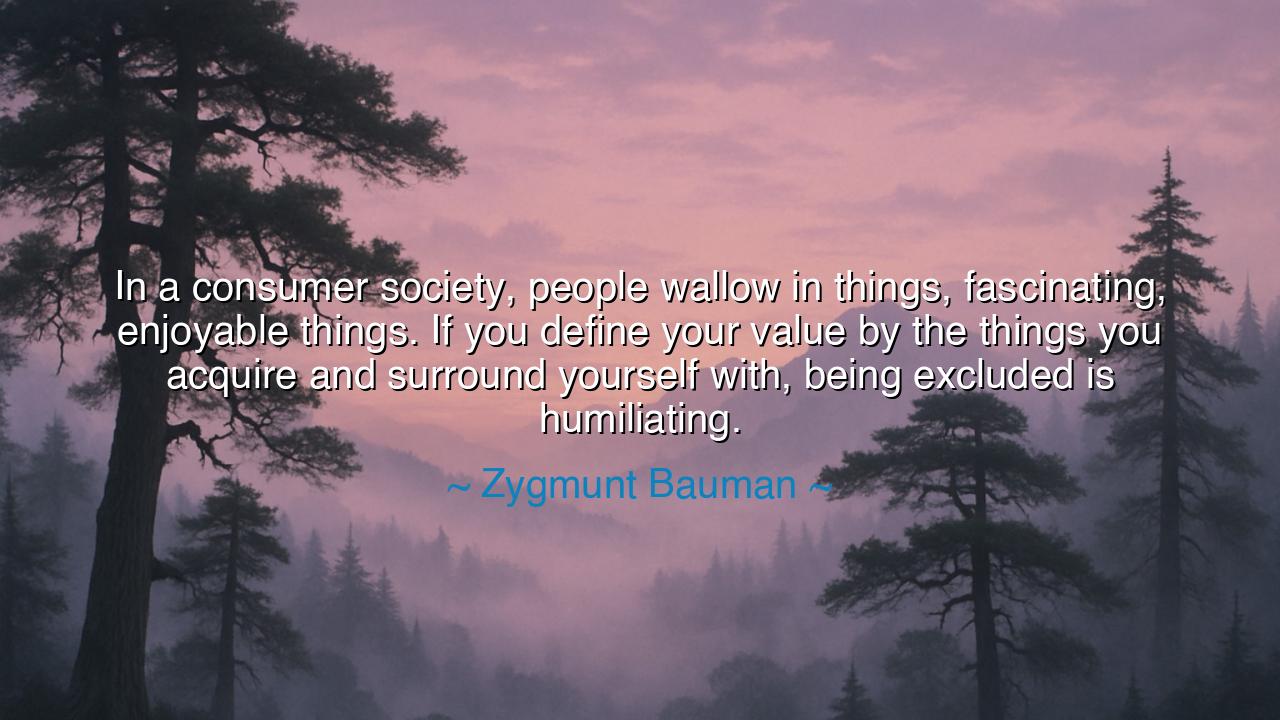
In a consumer society, people wallow in things, fascinating
In a consumer society, people wallow in things, fascinating, enjoyable things. If you define your value by the things you acquire and surround yourself with, being excluded is humiliating.






Hear now the words of Zygmunt Bauman, a sage who studied the spirit of modern times, and who warned us of the perils hidden beneath the glitter of abundance: “In a consumer society, people wallow in things, fascinating, enjoyable things. If you define your value by the things you acquire and surround yourself with, being excluded is humiliating.” These are not idle words, but a piercing cry against the idols of our age. For in the temples of consumerism, it is not gods of stone that are worshiped, but things—objects adorned with the illusion of meaning, treasures that promise joy but leave the soul unsatisfied.
From the dawn of humanity, people have always sought symbols of worth—crowns, jewels, titles, garments. But in the modern world, Bauman saw that this hunger had become boundless, for consumer society teaches that one’s very identity is measured by possessions. To drive the newest carriage, to wear the finest cloth, to hold the latest device—these become the badges of dignity. And when a man or woman cannot obtain them, they are not merely poor in goods, but humiliated in spirit, cast aside as though they are invisible. Thus, exclusion becomes not only economic, but existential.
History gives us countless lessons. In the roaring years of the 1920s, cities like New York and Berlin overflowed with dazzling displays of wealth—jazz, fashion, automobiles. Yet those left outside that glittering circle, the poor laborers and the unemployed, felt themselves diminished, their humanity questioned. When the Great Depression struck, it revealed the fragility of such illusions: fortunes vanished, possessions crumbled, but the need for dignity remained. Those who defined themselves by wealth were devastated, while those who defined themselves by purpose and community endured. Bauman’s words echo this truth—when we make our value dependent upon things, we build our house upon sand.
And yet, the danger is greater still. For when society teaches that value comes from possessions, people no longer seek to be, but only to have. They lose themselves in the endless cycle of acquisition, always hungry, never full. Things that once delighted soon become stale, replaced by the next fascination. Thus, the human heart becomes enslaved, not by chains of iron, but by chains of desire. And when such a person is excluded—unable to join in the feast of consumption—their humiliation is complete, for they feel stripped of worth itself.
But Bauman does not speak only to condemn; he speaks to awaken. His words call us to remember that true value does not lie in things, but in being—being kind, being wise, being courageous, being just. The poor man who loves and serves is richer than the wealthy miser who drowns in his possessions. The woman who shares her bread, though her table is humble, holds more dignity than the one who feasts alone. If exclusion from the world of consumption humiliates, it is only because society has forgotten where worth truly dwells.
What, then, is the lesson we must take? It is this: resist the lie that your identity is measured by what you own. Stand firm against the tide that says your dignity can be purchased. Choose instead to define yourself by virtues that cannot be bought—compassion, wisdom, integrity, love. Let your worth flow from what you give to others, not from what you gather for yourself. Build communities where no one is humiliated for their lack of things, but honored for the richness of their spirit.
And so, O children of tomorrow, let Bauman’s warning ring within you: do not wallow in things as though they were the measure of life. Enjoy them, perhaps, but never mistake them for your identity. For things fade, but character endures. When you choose being over having, you free yourself from the humiliation of exclusion, and you awaken to a freedom far greater than wealth—the freedom of knowing that your worth lies in who you are, and in the love you give to the world.






AAdministratorAdministrator
Welcome, honored guests. Please leave a comment, we will respond soon